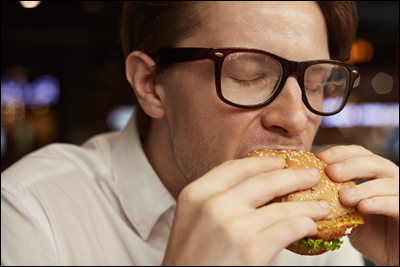How To Stop Stress Eating

Emotional eating happens to most of us, especially when we're stressed or going through a tense time.
Maybe you've cheered yourself up with a bowl of ice cream after an unusually tough day or snuck in some extra chocolate while you were venting to friend. But when emotional eating is the first and most frequent response to negative thoughts and feelings, it's time to get a grip.
What is stress eating?
Stress eating - or emotional eating - is pretty much what it sounds like. It's when you eat in order to escape whatever bad feelings you're experiencing. You hope the food will make you feel better. Sometimes it's a conscious decision, but more often it's just an automatic response to a negative emotion or what is perceived as a stressful situation. You may or may not not know what's bothering you, but you're pretty sure that food is the one thing that will cure whatever ails you.
Is it emotional or physical hunger?
There are few telltale signs that can help you distinguish emotional hunger or stress eating from true, physical hunger:
Emotional stress eating usually comes on suddenly. You start feeling stressed or tense and wham! You're craving takeout nachos. On the other hand, physical hunger tends to come on gradually. You're starting to feel hungry, but you can wait to eat - which gives you some time to choose wisely and satisfy that hunger with something that's good for you.
Stress eating usually causes a craving for a food that's sugary, fatty, high calorie and usually very specific. The craving isn't just for chocolate, but a slice of triple-choc mud cake from Espresso Workshop. In contrast, when you're physically hungry, food - in general - sounds good to you. You're willing to consider several options that will satisfy your physical hunger, which means you're more likely to make a better choice.
Once your physical hunger is satisfied and your stomach is comfortably full, it's a signal that you've had enough, and you tend to stop eating. But when emotions are the driver, it's easy to ignore what your stomach is telling you and you wind up eating way too much in order to make yourself feel better.
Stress eating might lift your mood momentarily, but shame and guilt often move in just as quickly. When you finish a meal that's satisfied your physical hunger, you don't usually feel guilty afterwards.
Tips for Dealing with Stress Eating Behaviors
Own up to your feelings. You know that emotions are the trigger for your stress eating, so why not acknowledge them? It's okay to be mad, scared, lonely or bored sometimes. The feelings may be unpleasant, but they're not dangerous - and you don't always need to 'fix' them. Let your emotions come and go without judging them. They are what they are.
Work on your coping skills. Every time you eat in response to stress, it's just a reminder that you can't cope with your emotions. When stress strikes, try asking yourself, "What's the worst thing that will happen if I don't eat?" Yes, your stress level might rise a bit, but the feeling will pass. If you let yourself simply experience the stress, you may find out that it's probably not as bad as you thought it would be. Practice tolerating your emotions or finding other ways to deal with your stress.
Find alternatives to eating. Take a few moments to reflect on your feelings and think of ways you can solve your problem. Make a list of things you can do instead of eating. Take a walk to clear your head, listen to music, read or call a friend and talk things over.
Unlearn your bad habits. Emotional eaters continually reinforce the idea that the best way to treat negative emotions is with food. And like other bad habits, stress eating happens before you've had a chance to think about it. For instance, one bad day may equal five hours of television and one container of ice cream. So, you need to "un-learn" your bad habits and practice doing something other than eating when a bad day strikes.
Wait it out. Stress eaters are often afraid that if they don't satisfy the urge to eat, the craving will just get worse and worse and worse. But, when they delay, they're often surprised that the urge simply passes. Rather than immediately giving in to your urges, promise yourself you'll wait a few minutes. Chances are you'll get distracted or busy and the craving will pass.
Stress eating may make you feel slightly better in the short term but, before you know it, this activity can impact on your health and weight.

